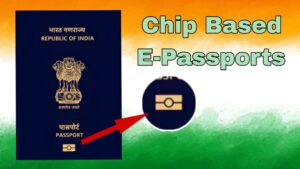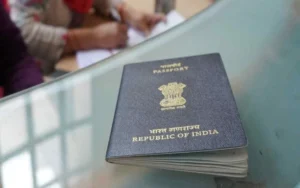With the introduction of chip-based e-passports a high-tech advancement of the regular passport, India has officially entered the future of international travel. E-passports combine the security of both paper and digital technologies and declaim safer travel, quickening periods of immigration checks, and a lot of progress towards digital governance. Furthermore, the e-passport tool aligns India with global standards and strengthens India’s modernization of citizen services by using technology.

What Is an E-Passport?
An e-passport or biometric passport is a standard passport supplemented with an embedded Radio Frequency Identification (RFID) chip and antenna. These electronic devices are combined as an inlayed part in the back cover of the booklet of a passport. Although the printed one still contains your normal personal details and photo, the RFID chip contains encrypted digital information, such as biometric data like fingerprints and iris scans.
This electronic layer of data makes it very hard to counterfeit or alter the passport, providing an added level of security for travelers. The US, UK, Germany, and Singapore have already embraced e-passports—and now India joins the club with its large-scale implementation.
From Pilot Project to National Rollout
India’s path to e-passports started as a pilot in April 2024. The pilot was monitored closely for operational efficiency, security level, and compatibility internationally. Satisfied with the successful operation in the pilot phase, the government had decided to initiate a nationwide deployment of e-passports in 2025.
The Ministry of External Affairs (MEA) coordinated with the India Security Press located in Nashik, which has been entrusted with the production and integration of these new biometric passports. It aims to introduce these e-passports in phases to all fresh applicants, re-issuances, and renewals in order to bring about a phased and smooth change.
Key Features of India’s E-Passports
The recently introduced e-passports are equipped with a series of advanced features designed to promote safety and facilitate travel experiences:
1. RFID Chip Integration
The core of the e-passport is an RFID chip containing vital information like the name, date of birth, passport number, and biometric details of the holder. The chip meets the International Civil Aviation Organization (ICAO) standards, so Indian passports are readable at immigration desks across the globe.
2. Enhanced Data Security
All information stored in the chip is encrypted and digitally signed, which means it is essentially impossible to tamper with undetected. Any illicit modifications would cause the passport to become invalid, which will minimize identity theft, fraud, and forgery.
3. Faster Immigration Processing
Because e-passports can be accessed by contactless electronic readers, they significantly shorten the time spent at immigration gates. This results in fewer lines at airports and a smoother entry/exit for travelers.
4. Future Compatibility
These e-passports are designed to be compatible with automated border control systems and e-gates used in many developed countries. Over time, this will also allow India to adopt similar systems, improving both domestic and international travel infrastructure.
How Will It Benefit Indian Travelers?
The benefits of e-passports are not just limited to governments or security agencies—they directly impact every Indian traveler:
1. Increased safety: Your identity is more secure, thanks to biometric encryption.
2. Faster travel: Reduced waiting time at immigration thanks to quick scanning.
3. Global recognition: Easier processing in countries that already support e-passport systems.
4. Less risk of misuse: Lost or stolen passports are harder to duplicate or forge.
Is Your Old Passport Still Valid?
Yes. The current regular passports will still be valid until they expire. It is not necessary to transition immediately to an e-passport. Anyone who wants a new passport or renewal, however, will be given the new chip-equipped version.

All qualified travelers of both Tatkal and regular passport facilities will equally derive advantages from the introduction. Government officials stated decisively that they would not demand any extra charges for the e-passport but rather normal charges as an applicant.
How to Apply for an E-Passport
The process of applying for an e-passport remains the same as the current passport application:
-
Visit the Passport Seva portal
-
Fill out the application and book an appointment at your nearest Passport Seva Kendra (PSK).
-
Attend the appointment with the necessary documents and biometrics.
-
Your passport will be printed and embedded with the chip before dispatch.
If you are renewing your passport, you will automatically be issued the new e-passport variant.
What About Privacy Concerns?
Not surprisingly, the application of biometric information and RFID technology brings forward issues of privacy and data safeguarding. Nevertheless, the government of India has ensured that all data are encrypted and access is limited to authorized systems only. Moreover, RFID-blocking technology is built into the cover of the passport to ensure that unauthorized access is not possible.

Still, as with all technologies, citizens are advised to remain cautious and report any suspicious activity to relevant authorities.
Global Implications and India’s Digital Push
The introduction of e-passports is one more part of India’s change to digital identity, accompanied by other programs such as Digital India and Smart Governance initiatives. It also puts India in a position with roughly 100 other countries that also offer e-passports, leading to a stronger global positioning, capable of facilitating ease of movement and cooperation across borders.
For Indian residents, this translates to an increasingly valued travel document, increased efficiency, and much more robust security features while traveling overseas.
Also Read: Aadhaar Misuse Alert! Take action now
India’s launch of chip-based e-passports is a historical milestone in the process of modernizing one of the most important documents of identity for its people. Through the use of RFID technology, biometric encryption, and international standards of compatibility, the government is making travel safer and smarter for everyone. With these passports spreading across the globe in the years to come, Indian travelers can expect an effortless, secure, and technologically advanced experience at airports worldwide.
